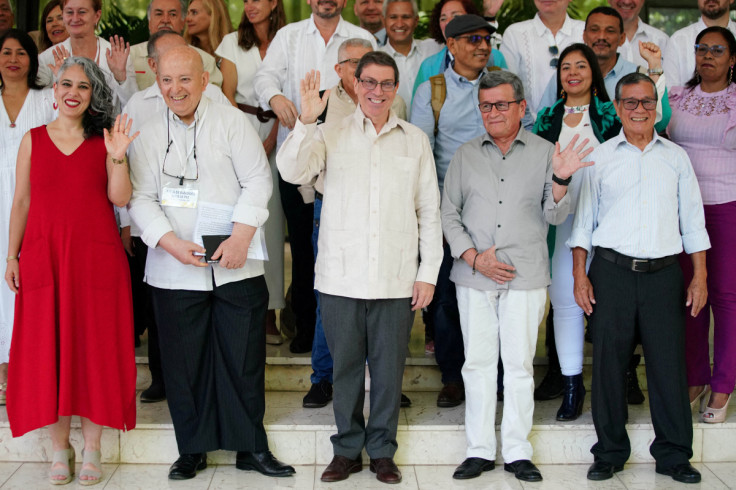Colombia, ELN Rebels Declare Ceasefire As Latest Cycle Of Talks Ends

Colombia's government and the left-wing ELN guerrilla group declared a bilateral ceasefire on Friday, as a third cycle of peace talks closed in Havana.
Preparations for the ceasefire, which will come into full force on Aug. 3 and last 180 days, are due to begin immediately, said Cuba's foreign minister Bruno Rodriguez, speaking on behalf of the participants.
"On Aug. 3, 2023, the full implementation ... of the national and temporary bilateral ceasefire will begin with the full application of the protocols and the full operation of the monitoring and verification mechanism," Rodriguez said.
A fourth cycle of peace talks will take place in Venezuela between Aug. 14 and Sept. 4, Rodriguez said.
The ceasefire announcement is good news for the embattled Colombian president Gustavo Petro, who is facing allegations at home of financial irregularities in his election campaign, threatening other aspects of his planned political and social reforms.
"Here ends a phase of armed insurgency in Latin America," Petro told participants at the closing ceremony in Havana. "The world of arms, and of killing one another ... must cease."
Colombia's conflict, which has run for nearly six decades, has killed at least 450,000 people.
The leftist Petro, who flew from Colombia to attend the ceasefire announcement, early in his tenure promised an ambitious plan for total peace in the South American nation long plagued by domestic conflict.
The Havana negotiations stalled in mid-May after Petro questioned the group's unity of leadership, prompting a rebuke from the ELN, which at the time said talks had entered into "crisis."
The ELN is Colombia's oldest remaining rebel group, and the talks are the cornerstone of efforts by Petro - himself once a member of the now-demobilized M-19 insurgents - to negotiate peace or surrender deals with remaining rebels and crime gangs, as well as to fully implement a 2016 accord with the FARC rebel group.
Mexico, Norway, Venezuela, Cuba, Brazil and Chile are guarantor nations for the negotiations.
Cuban President Miguel Diaz-Canel, who also spoke at the ceremony, said Cuba had persevered in the peace process and had obtained results, he said, despite paying a "high price" for its participation.
The United States in 2021 designated Cuba as a state sponsor of terrorism in part, it said, because Havana, citing peace process protocols, had refused to extradite ELN leaders on the island following a January 2019 bombing in Bogota.
"The price we have paid is high, but we do not regret it," Diaz-Canel said.
© Copyright Thomson Reuters 2024. All rights reserved.




















